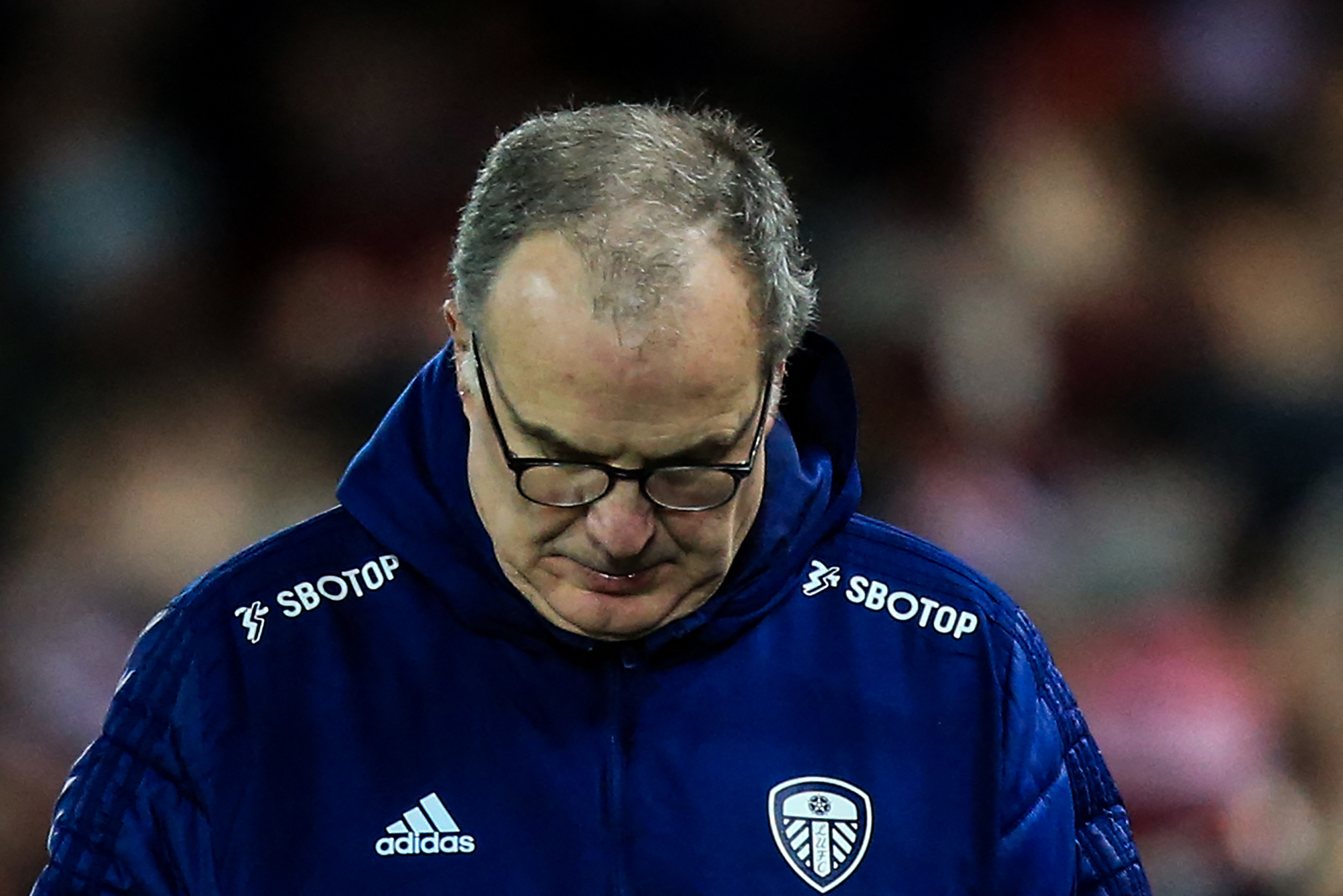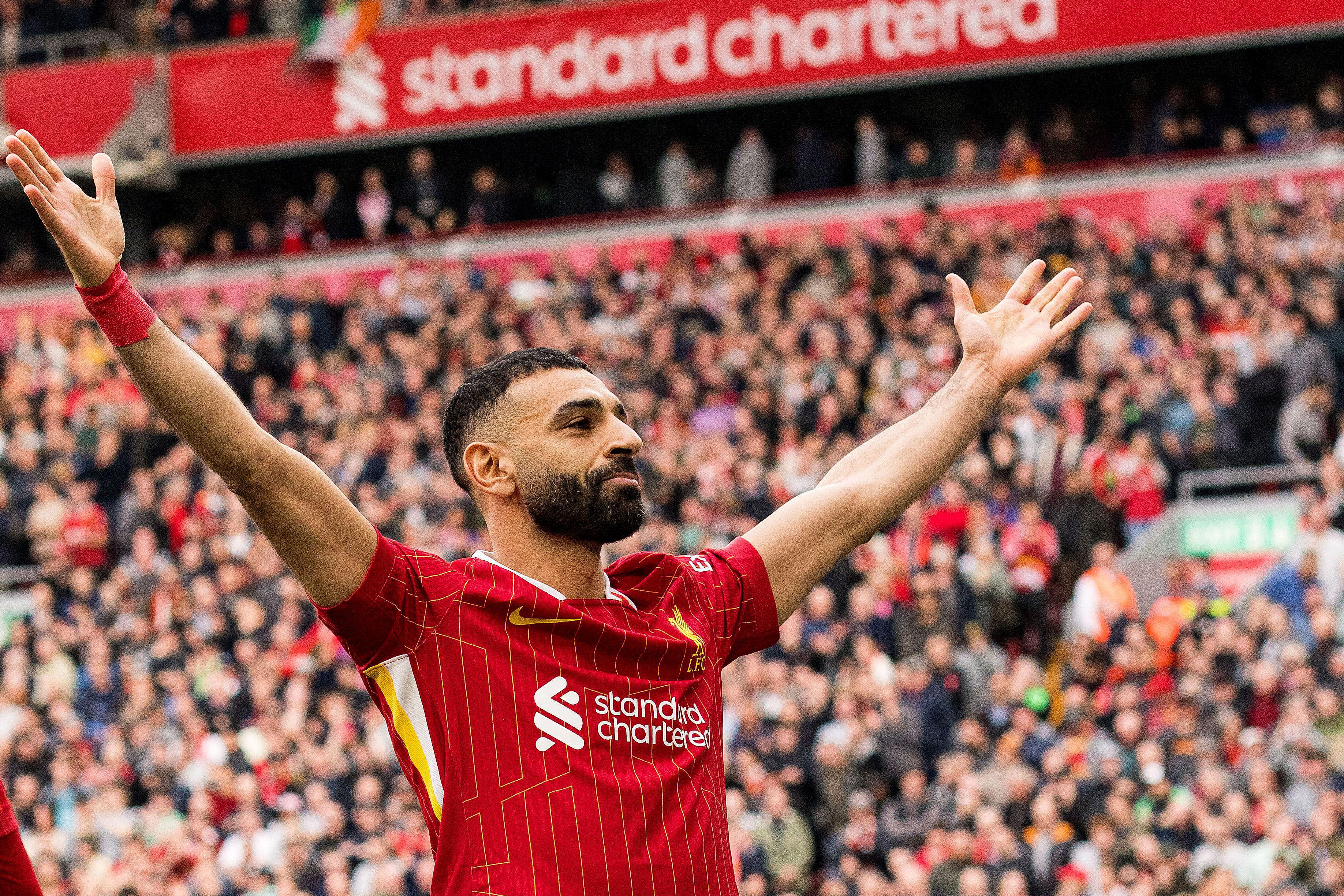How will Leeds United play post-Marcelo Bielsa?
Perhaps no Premier League club will ever replicate the extreme style of pressing seen at Bielsa's Leeds United

The mural will remain in Leeds. A permanent tribute is being planned at Elland Road. Marcelo Bielsa is gone but not forgotten, Jesse Marsch in the slightly uncomfortable position of presumably knowing that, however well he does, he will not take the Argentinian’s place in many hearts. He will be less idolised, less iconic, less idiosyncratic.
Yet while Bielsa’s legend will live on, and perhaps sacking him before he could have got relegated may help preserve it, the process of deBielsaification will begin. It has to, and not merely because of Leeds’ plight, after four successive defeats, or their disastrous defensive record, with 20 goals conceded in five games and 60 all season.
But also because if Bielsa’s uniqueness contributed to the cult that surrounds him, it means any successor has to make alterations. And because of the extreme nature of Bielsa’s approach, any changes will be a shift back towards the mainstream. They will by definition be less radical.
Bielsa took ideas to their limits; more orthodox thinkers tend to produce more conventional teams. Perhaps Jorge Sampaoli preserved more of Bielsa than anyone else as a continuity candidate with Chile; Ernesto Valverde was a logical and successful choice to take over at Athletic Bilbao.
And Marsch’s fondness for pressing means he is scarcely Bielsa’s antithesis. A manager who has been employed by Ralf Rangnick and who has replaced Julian Nagelsmann can be found in the German school of thought. Leeds have not replaced the Argentinian with an American Tony Pulis, someone who will rip up his blueprint.
But influential as Bielsa is, as he said a couple of weeks ago, no one plays like him. Not even those who played for him and cite him as an inspiration, such as Mauricio Pochettino, Eduardo Berizzo and Tata Martino. The simple reason is that no one else deploys man-markers all over the pitch. Every other manager will use some form of zonal system, some way of affording extra cover to a player who loses his individual battle. More regular thinking will stop the midfield becoming emptied for players to run through or defenders being dragged way of position as they concentrate completely on following one opponent.
Perhaps it is no surprise that Bielsa’s demands necessitated multifunctional players. Stuart Dallas was Leeds’ finest performer last season and he is also their most versatile; capable of occupying various positions, he in effect did in the same game. That universality made him invaluable, but perhaps specialists in particular roles can suffer from Bielsa’s football. Maybe Marsch’s reign will show if Junior Firpo is, as he has looked, an atrocious signing or just a fine left-back who was ill-suited to going mano-a-mano for 90 minutes.
Get FourFourTwo Newsletter
The best features, fun and footballing quizzes, straight to your inbox every week.
Likewise, while Leeds’ defending has felt anarchic in basketball matches on football pitches, perhaps some will respond better to simply being asked to play as a centre-back or a holding midfielder, as they were by other managers elsewhere.
Because there is an easy and lazy line that has been trotted out far too frequently of late: that Bielsa was working with a Championship squad. It was only half true, and not just because he turned Kalvin Phillips into a high-class midfielder. Half his team were his Championship stalwarts and many of them – Phillips, Dallas, Patrick Bamford, Jack Harrison, Luke Ayling, Mateusz Klich, Liam Cooper – were his great success stories. And, after almost four years, better attuned to his methods.
The other half were generally expensive arrivals with far more pedigree. Raphinha is a special player who, after excelling for Bielsa, is starting for Brazil. Rodrigo arrived as Spain’s No. 9, though he has lost that status. Firpo played for Barcelona, Dan James regularly for Manchester United. Diego Llorente and Robin Koch are Spain and Germany international centre-backs who were in their respective countries’ Euro 2020 squads. Few Championship squads have a starter for Brazil, Spain’s No. 9, Spain and Germany international centre-backs and players with reasonable number of appearances for Barcelona and United in the side. Llorente finished last season in fine form but only Raphinha was really a success for Bielsa.
And there may be an antidote to the anarchy at the back. Certainly, it will be instructive if Llorente and Koch, who have hardly started together, and still more rarely as a partnership, or indeed the promising Pascal Struijk, look top-quality centre-backs when given more standard duties in a more regular defensive gameplan.
If the defenders have suffered in particular in thrashings by more talented teams as the flaw in the idea of man-marking when at least some of the opposing 11 were far more gifted than their designated policemen has been exposed, Marsch is likely to signal a shift in thinking. After the revolutionary, this could be a move back towards normality. DeBielsaification is on the way.
Subscribe to FourFourTwo today and save over a third on shop price
Restock your kit bag with the best deals for footballers on Amazon right now
ALSO READ
INTERVIEW James Milner's Perfect XI: "Gerrard was the best all-round footballer I’ve ever played with"
Richard Jolly also writes for the National, the Guardian, the Observer, the Straits Times, the Independent, Sporting Life, Football 365 and the Blizzard. He has written for the FourFourTwo website since 2018 and for the magazine in the 1990s and the 2020s, but not in between. He has covered 1500+ games and remembers a disturbing number of the 0-0 draws.


